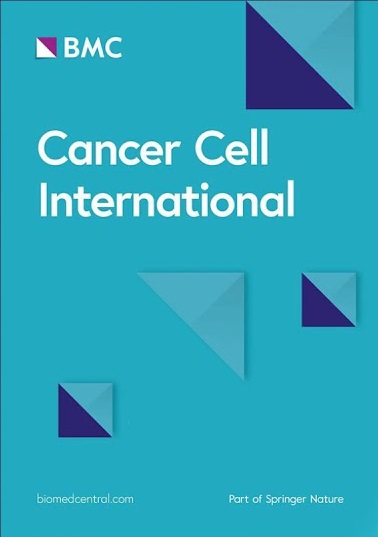PFKP 在泛癌症中的综合预后和免疫学意义
IF 6
2区 医学
Q1 ONCOLOGY
引用次数: 0
摘要
磷酸果激酶 P(PFKP)是糖酵解过程中的一种关键限速酶,在各种病理生理过程中发挥着至关重要的作用。然而,它在肿瘤中的具体功能仍不清楚。本研究旨在评估 PFKP 在多种肿瘤类型(泛癌)中的表达和特定作用,并探讨其作为癌症治疗靶点的潜在临床意义。我们利用癌症基因组图谱(TCGA)和基因表达总库(GEO)数据库中的数据分析了各种癌症中 PFKP 的表达、免疫细胞浸润和患者预后。此外,我们还在肺癌细胞中进行了一系列实验,包括 Western 印迹、CCK-8 检测、集落形成检测、Transwell 迁移检测、划痕伤口愈合检测、LDH 释放检测和流式细胞术,以评估 PFKP 对肿瘤细胞的影响。研究发现,PFKP 在大多数癌症中高度表达,并被确定为预后风险因素。PFKP 表达升高与较差的临床预后有关,尤其是在肺腺癌(LUAD)中。接收操作特征曲线(ROC)分析表明,PFKP 能有效区分癌组织和正常组织。大多数肿瘤中 PFKP 的表达与肿瘤突变负荷(TMB)、微卫星不稳定性(MSI)、免疫评分和免疫细胞浸润有显著相关性。体外实验表明,PFKP 过度表达会促进肺癌细胞的增殖和迁移,同时抑制细胞凋亡,而 PFKP 缺乏则会导致相反的效果。PFKP 是一种参与肿瘤发生的癌基因,可能会影响肿瘤内的免疫微环境。我们的研究结果表明,PFKP 可作为预测肿瘤预后和免疫疗法疗效的潜在生物标记物。本文章由计算机程序翻译,如有差异,请以英文原文为准。
A comprehensive prognostic and immunological implications of PFKP in pan-cancer
Phosphofructokinase P (PFKP) is a key rate-limiting enzyme in glycolysis, playing a crucial role in various pathophysiological processes. However, its specific function in tumors remains unclear. This study aims to evaluate the expression and specific role of PFKP across multiple tumor types (Pan-cancer) and to explore its potential clinical significance as a therapeutic target in cancer treatment. We analyzed the expression of PFKP, immune cell infiltration, and patient prognosis across various cancers using data from the Cancer Genome Atlas (TCGA) and Gene Expression Omnibus (GEO) databases. Additionally, we conducted a series of experiments in lung cancer cells, including Western blot, CCK-8 assay, colony formation assay, transwell migration assay, scratch wound healing assay, LDH release assay, and flow cytometry, to evaluate the impact of PFKP on tumor cells. PFKP was found to be highly expressed in most cancers and identified as a prognostic risk factor. Elevated PFKP expression is associated with poorer clinical outcomes, particularly in lung adenocarcinoma (LUAD). Receiver operating characteristic (ROC) curve analysis indicated that PFKP can effectively differentiate between cancerous and normal tissues. The expression of PFKP in most tumors showed significant correlations with tumor mutational burden (TMB), microsatellite instability (MSI), immune score, and immune cell infiltration. In vitro experiments demonstrated that PFKP overexpression promotes lung cancer cell proliferation and migration while inhibiting apoptosis, whereas PFKP deficiency results in the opposite effects. PFKP acts as an oncogene involved in tumorigenesis and may influence the immune microenvironment within the tumor. Our findings suggest that PFKP could serve as a potential biomarker for predicting prognosis and the efficacy of immunotherapy in tumors.
求助全文
通过发布文献求助,成功后即可免费获取论文全文。
去求助
来源期刊

Cancer Cell International
ONCOLOGY-
CiteScore
10.90
自引率
1.70%
发文量
360
审稿时长
1 months
期刊介绍:
Cancer Cell International publishes articles on all aspects of cancer cell biology, originating largely from, but not limited to, work using cell culture techniques.
The journal focuses on novel cancer studies reporting data from biological experiments performed on cells grown in vitro, in two- or three-dimensional systems, and/or in vivo (animal experiments). These types of experiments have provided crucial data in many fields, from cell proliferation and transformation, to epithelial-mesenchymal interaction, to apoptosis, and host immune response to tumors.
Cancer Cell International also considers articles that focus on novel technologies or novel pathways in molecular analysis and on epidemiological studies that may affect patient care, as well as articles reporting translational cancer research studies where in vitro discoveries are bridged to the clinic. As such, the journal is interested in laboratory and animal studies reporting on novel biomarkers of tumor progression and response to therapy and on their applicability to human cancers.
 求助内容:
求助内容: 应助结果提醒方式:
应助结果提醒方式:


